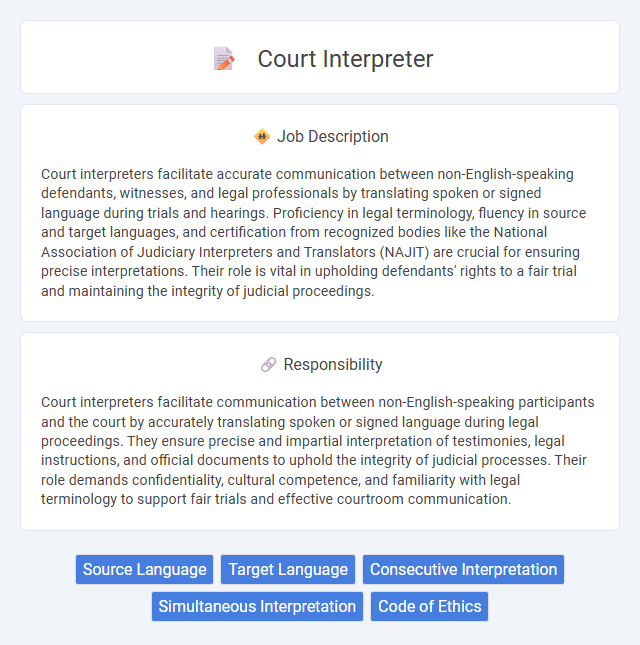
Court interpreters facilitate accurate communication between non-English-speaking defendants, witnesses, and legal professionals by translating spoken or signed language during trials and hearings. Proficiency in legal terminology, fluency in source and target languages, and certification from recognized bodies like the National Association of Judiciary Interpreters and Translators (NAJIT) are crucial for ensuring precise interpretations. Their role is vital in upholding defendants' rights to a fair trial and maintaining the integrity of judicial proceedings.
Court interpreter roles likely suit individuals with strong language skills, cultural awareness, and the ability to remain impartial under pressure. Those who handle stressful environments well and possess excellent communication and listening abilities may find this job fulfilling. Candidates struggling with high-stress situations or lacking advanced linguistic proficiency might face challenges in meeting the demands of this profession.
Qualification
Court interpreters must possess fluency in at least two languages alongside a deep understanding of legal terminology and courtroom procedures. Certification from recognized bodies such as the National Association of Judiciary Interpreters and Translators (NAJIT) or the Federal Court Interpreter Certification Examination (FCICE) is often required to validate their competence. Strong ethical standards, including impartiality and confidentiality, are essential qualifications ensuring accurate and unbiased communication in legal settings.
Responsibility
Court interpreters facilitate communication between non-English-speaking participants and the court by accurately translating spoken or signed language during legal proceedings. They ensure precise and impartial interpretation of testimonies, legal instructions, and official documents to uphold the integrity of judicial processes. Their role demands confidentiality, cultural competence, and familiarity with legal terminology to support fair trials and effective courtroom communication.
Benefit
Court interpreters likely experience numerous benefits, including the opportunity to bridge communication gaps in legal settings, which enhances the fairness of judicial proceedings. They may enjoy job stability due to consistent demand in courts requiring language assistance. Benefits often extend to professional development and exposure to diverse legal terminology, enriching their career growth.
Challenge
Court interpreter jobs likely present significant challenges due to the critical need for flawless language accuracy under pressure. These professionals probably face high-stress environments where misunderstandings can have serious legal consequences. Mastery of legal terminology and cultural nuances may be essential to effectively navigate complex courtroom proceedings.
Career Advancement
Court interpreters can progress from entry-level assignments to specialized roles in federal or appellate courts, gaining expertise in legal terminology and courtroom procedures. Obtaining certifications such as the Federal Court Interpreter Certification enhances credibility and increases eligibility for higher-paying positions. Pursuing continuous education and language proficiency improvements opens opportunities for leadership roles, training, and consulting within the judiciary system.
Key Terms
Source Language
Court interpreters must possess exceptional proficiency in the source language to accurately convey testimonies and legal statements during trials, depositions, and hearings. Mastery of specialized legal terminology and cultural nuances in the source language ensures precise interpretation, maintaining the integrity of judicial proceedings. Fluency in the source language combined with a comprehensive understanding of legal protocols enhances communication between non-English-speaking witnesses and legal professionals.
Target Language
Court interpreters require advanced proficiency in the target language to accurately convey legal terminology and courtroom proceedings. Mastery of the target language ensures precise interpretation of witness testimonies, judge's instructions, and legal arguments, facilitating fair trials. Expertise in the target language also demands understanding cultural nuances to maintain the integrity of the legal process.
Consecutive Interpretation
Court interpreters specializing in consecutive interpretation facilitate clear communication by accurately translating spoken statements after the speaker pauses, ensuring legal proceedings remain fair and precise. Expertise in legal terminology and the ability to maintain confidentiality are critical for delivering effective consecutive interpretation in court settings. Mastery of this skill supports judges, attorneys, and defendants by bridging language barriers without disrupting courtroom flow.
Simultaneous Interpretation
Simultaneous interpretation in a court setting demands exceptional linguistic proficiency and real-time processing skills to accurately translate spoken language without delay. Court interpreters must maintain confidentiality, impartiality, and a thorough understanding of legal terminology to ensure fair proceedings. Mastery in simultaneous interpretation enhances courtroom communication and promotes justice across diverse language-speaking participants.
Code of Ethics
Court interpreters must adhere strictly to the Code of Ethics, ensuring accuracy, impartiality, and confidentiality in all judicial proceedings. Their role demands maintaining professional conduct by avoiding conflicts of interest and refraining from unauthorized practice or disclosure of sensitive information. Upholding these ethical standards is crucial to preserving the integrity of the legal process and guaranteeing fair communication for all parties involved.
 kuljobs.com
kuljobs.com